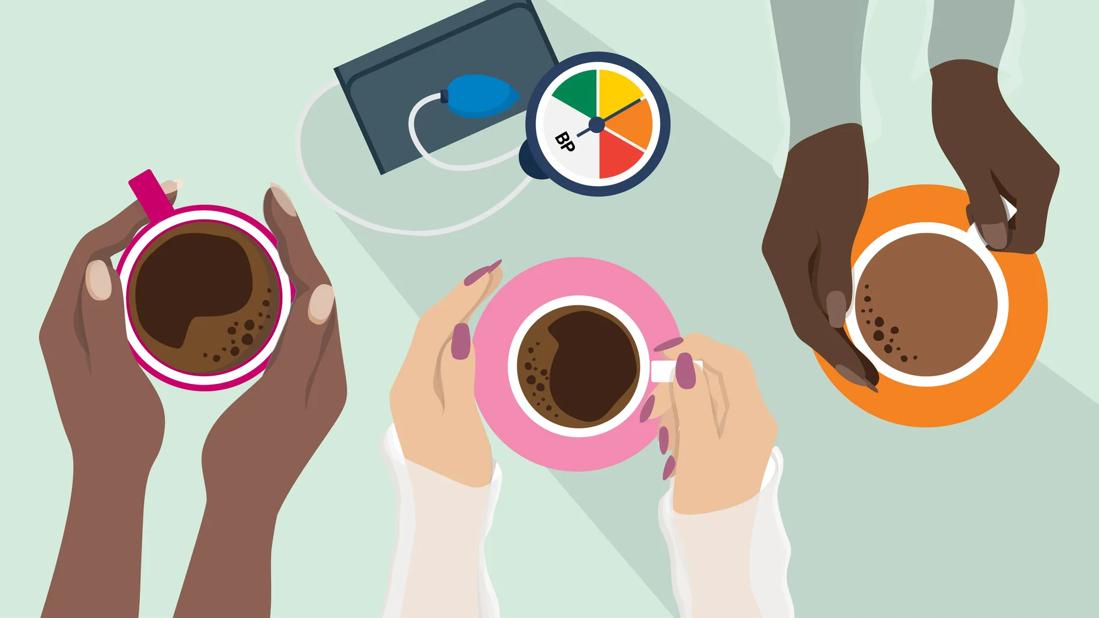Moderation is best when consuming caffeinated drinks to avoid unhealthy spikes in BP

Image content: This image is available to view online.
View image online (https://assets.clevelandclinic.org/transform/acd2dd25-6fe5-49cd-b127-51a59ec23bce/coffee-blood-pressure-1347542305)
Three sets of hands holding coffee mugs and cups, with blood pressure reader and cuff on table
Caffeine turns a drink into jolt juice. So, as you sip on your cup of coffee or slam down an energy drink, you often FEEL the effect as the caffeine flows into your system. It can strike like a thunderbolt.
Advertisement
Cleveland Clinic is a non-profit academic medical center. Advertising on our site helps support our mission. We do not endorse non-Cleveland Clinic products or services. Policy
But did you ever wonder what that liquid oomph does to blood pressure (BP)? Given that nearly half of all adults in the United States live with high blood pressure (hypertension), that’s an important question.
For an answer, we turn to cardiologist Luke Laffin, MD.
Caffeine is the world’s most-used natural stimulant. It has long been a go-to energy source for anyone needing a boost. (FUN FACT: Legend has it that a ninth-century goat herder discovered the magic of coffee beans after his grazing animals ate them and wouldn’t sleep.)
But caffeine does more than just deliver a buzz to your body.
The psychoactive substance also narrows (or constricts) your blood vessels, says Dr. Laffin. The tightening forces your heart to work harder, which increases the pressure needed to pump blood throughout your body.
The increase in blood pressure typically takes place within 30 minutes of drinking a caffeinated beverage and peaks after about an hour.
“Then, it will linger for a bit before your blood pressure comes back down,” says Dr. Laffin.
A blood pressure reading of 120/80 is typically considered the upper edge of what’s considered healthy. (Those measurements for systolic and diastolic blood pressure are units of pressure known as millimeters of mercury, or mmHg.)
Advertisement
A morning cup of coffee can potentially raise your blood pressure by up to 10 mmHg, which may be enough to push you into a range that’s classified as stage 1 hypertension. A second, third or fourth cup keeps those numbers climbing, too.
“Caffeine can move your blood pressure from what’s considered ‘controlled’ to ‘uncontrolled’ pretty easily,” he adds.
Like many things in life, caffeine is best enjoyed in moderation.
Research shows that most healthy adults can consume up to 400 milligrams of caffeine a day with no adverse health effects. (To put that in perspective, an 8-ounce cup of regular coffee typically has 80 to 100 mg of caffeine.)
In general, concern over elevating your blood pressure isn’t a reason to swear off coffee if your BP is in a healthy range.
“A moderate amount of coffee is probably OK for you,” reiterates Dr. Laffin. “If you start measuring your coffee consumption by pots or you’re chugging energy drink after energy drink, it’s a different story. It can become a problem.”
If you’ve been diagnosed with high blood pressure, limiting your caffeine intake to below 400 mg is recommended. Talk to your healthcare provider about what your daily caffeine cap should be.
Caffeine hits everyone differently. Some might get the jitters after a single cup of java. Others may be able to rotate fresh cups of brew on their desk all day without ever really feeling revved up.
But not feeling the effects of caffeine doesn’t mean it’s not impacting your body. Caffeine consumption DOES bump up your BP and heart rate — and over time, that strain on your cardiovascular system can take a toll.
“It’s best to observe some limits,” advises Dr. Laffin.
If you feel like you can’t function without large doses of caffeine, it’s probably best to ask yourself why.
“Take a hard look at why you might need so much caffeine,” he recommends. “Are you not getting enough sleep? Is there some sort of medical issue making you tired? Is it stress? These are questions worth asking.”
And getting an answer can’t hurt when it comes to better managing your blood pressure.
Advertisement

Sign up for our Health Essentials emails for expert guidance on nutrition, fitness, sleep, skin care and more.
Learn more about our editorial process.
Advertisement
Foods high in potassium, calcium and vitamins C and E can help lower your blood pressure
Making lifestyle changes can help reduce your blood pressure, but taking cinnamon supplements probably isn’t one of them
Hypertension strains your heart and blood vessels, causing damage that can contribute to heart attacks
Daily stressors can increase BP in the moment, as well as contribute to habits that can feed long-term hypertension
Medication, exercise and diet changes can all help
While not magic elixirs, some drinks like beet juice and skim milk may help keep numbers down
Don’t believe the rumors about aspirin being a magic way to lower BP
Blood pressure naturally dips when we sleep — and that dipping is crucial for a healthy heart
Although it could be used as a moisturizer, this new trend is not recommended
Communicating clear limits helps protect your time, energy and emotional well-being
High cholesterol can be genetic, but testing and treatment can lower your heart disease risk